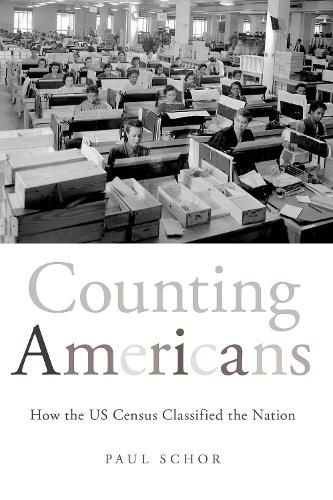Readings Newsletter
Become a Readings Member to make your shopping experience even easier.
Sign in or sign up for free!
You’re not far away from qualifying for FREE standard shipping within Australia
You’ve qualified for FREE standard shipping within Australia
The cart is loading…






How could the same person be classified by the US census as black in 1900, mulatto in 1910, and white in 1920? The history of categories used by the US census reflects a country whose identity and self-understanding–particularly its social construction of race–is closely tied to the continuous polling on the composition of its population. By tracing the evolution of the categories the United States used to count and classify its population from 1790 to 1940, Paul Schor shows that, far from being simply a reflection of society or a mere instrument of power, censuses are actually complex negotiations between the state, experts, and the population itself. The census is not an administrative or scientific act, but a political one. Counting Americans is a social history exploring the political stakes that pitted various interests and groups of people against each other as population categories were constantly redefined. Utilizing new archival material from the Census Bureau, this study pays needed attention to the long arc of contested changes in race and census-making. It traces changes in how race mattered in the United States during the era of legal slavery, through its fraught end, and then during (and past) the period of Jim Crow laws, which set different ethnic groups in conflict. And it shows how those developing policies also provided a template for classifying Asian groups and white ethnic immigrants from southern and eastern Europe–and how they continue to influence the newly complicated racial imaginings informing censuses in the second half of the twentieth century and beyond. Focusing in detail on slaves and their descendants, on racialized groups and on immigrants, and on the troubled imposition of U.S. racial categories upon the populations of newly acquired territories, Counting Americans demonstrates that census-taking in the United States has been at its core a political undertaking shaped by racial ideologies that reflect its violent history of colonization, enslavement, segregation and discrimination.
$9.00 standard shipping within Australia
FREE standard shipping within Australia for orders over $100.00
Express & International shipping calculated at checkout
How could the same person be classified by the US census as black in 1900, mulatto in 1910, and white in 1920? The history of categories used by the US census reflects a country whose identity and self-understanding–particularly its social construction of race–is closely tied to the continuous polling on the composition of its population. By tracing the evolution of the categories the United States used to count and classify its population from 1790 to 1940, Paul Schor shows that, far from being simply a reflection of society or a mere instrument of power, censuses are actually complex negotiations between the state, experts, and the population itself. The census is not an administrative or scientific act, but a political one. Counting Americans is a social history exploring the political stakes that pitted various interests and groups of people against each other as population categories were constantly redefined. Utilizing new archival material from the Census Bureau, this study pays needed attention to the long arc of contested changes in race and census-making. It traces changes in how race mattered in the United States during the era of legal slavery, through its fraught end, and then during (and past) the period of Jim Crow laws, which set different ethnic groups in conflict. And it shows how those developing policies also provided a template for classifying Asian groups and white ethnic immigrants from southern and eastern Europe–and how they continue to influence the newly complicated racial imaginings informing censuses in the second half of the twentieth century and beyond. Focusing in detail on slaves and their descendants, on racialized groups and on immigrants, and on the troubled imposition of U.S. racial categories upon the populations of newly acquired territories, Counting Americans demonstrates that census-taking in the United States has been at its core a political undertaking shaped by racial ideologies that reflect its violent history of colonization, enslavement, segregation and discrimination.